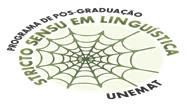Banca de DEFESA: ARIANE CAROLINE DA SILVA FIGUEIREDO
Uma banca de DEFESA de MESTRADO foi cadastrada pelo programa.DISCENTE : ARIANE CAROLINE DA SILVA FIGUEIREDO
DATA : 12/09/2025
HORA: 08:00
LOCAL: Sala Google meet
TÍTULO:
THE MOVEMENTS OF SENSES IN CÁCERES URBAN POETRY
PALAVRAS-CHAVES:
Discourse; Poetry; City; Memory; Cáceres-MT.
PÁGINAS: 84
GRANDE ÁREA: Lingüística, Letras e Artes
ÁREA: Lingüística
RESUMO:
This dissertation is linked to the research line "Study of Discursive Processes," under the area of "Study of Linguistic Processes," within the Stricto Sensu Graduate Program in Linguistics (PPGL) at the Universidade do Estado de Mato Grosso "Carlos Alberto Reyes Maldonado" (Unemat). It is grounded in the theoretical framework of Materialist Discourse Analysis, founded by Michel Pêcheux in France and further developed by Eni Orlandi and other scholars in Brazil. This approach investigates discourse and language in operation, considering the non-transparency of language by questioning history and relating it to language to study the (re)production of meaning under given conditions of production. This study takes the city as its research object, seeking to observe the effects of meaning produced by poetic discourse, with its discursive materiality consisting of poetic works about Cáceres. We aim to understand how the city is projected through and within the imaginary formations that constitute the poems, as well as through the discursive threads that shape them in their portrayal of Cáceres-MT. To this end, we analyze the enunciations of three poets who write about Cáceres as a significant materiality, examining how their poetic texts—namely, "Pôr do sol cacerense" and "Às margens do rio Paraguai" by Odair José da Silva; "Ilha de Cáceres" and "Córrego sangradouro" by Natalino Ferreira Mendes; and "Cáceres e seus encantos" by Antonio José Ferreira da Costa—render the city visible and explore the functioning of meaning in the text and the "[...] city in its reality of signification" (Orlandi, 1999, p. 9).Thus, from a discursive perspective, we argue that the city is characterized by a set of reading and interpretive gestures. That is, the city produces meanings that traverse it through discourse, where language takes on materiality, demanding acts of reading and interpretation—since, in discursive theory, interpretation is problematized, and language is subject to flaws and alternative meanings. In our analysis, we observe different effects of authorship, where the meanings attributed to the city vary. In Mendes (1993), we note the inscription of a subject who intertwines the colonization process with the city's history, reinforcing a sense of belonging and Cáceres identity. In Silva’s poetic texts (2016, 2023), the poet-subject is constituted through the relationship with the city and its losses (material, symbolic, affective). Identification with the city emerges precisely in absences and in the awareness that, as the city transforms, it also transforms the subject, who is thus re-signified and modified. In Costa’s poetic text (2008), we observe an intertwining of the poet-subject position with the cultural, environmental, and affective elements that constitute Cáceres. The author mobilizes networks of signifiers that recover local memories, evoke religiosity, historical monuments, and the Paraguay River as markers of Cáceres' identity.
MEMBROS DA BANCA:
Presidente - 101625005 - FLAVIO ROBERTO GOMES BENITES
Interna - 83109001 - ANA LUIZA ARTIAGA RODRIGUES DA MOTTA
Externo à Instituição - MARCOS AURELIO BARBAI - UNICAMP



